2024届高考英语二轮复习定语从句、状语从句 课件(共61张PPT)
文档属性
| 名称 | 2024届高考英语二轮复习定语从句、状语从句 课件(共61张PPT) | 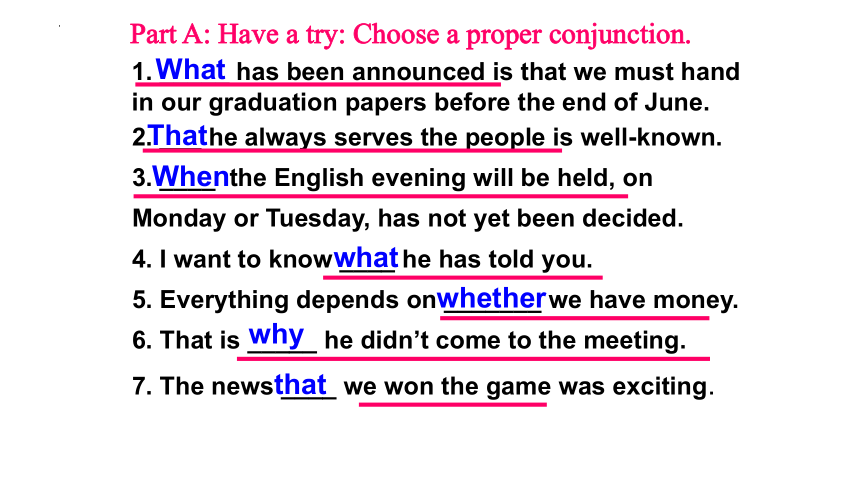 | |
| 格式 | pptx | ||
| 文件大小 | 631.7KB | ||
| 资源类型 | 教案 | ||
| 版本资源 | 通用版 | ||
| 科目 | 英语 | ||
| 更新时间 | 2023-11-25 09:21:47 | ||
图片预览


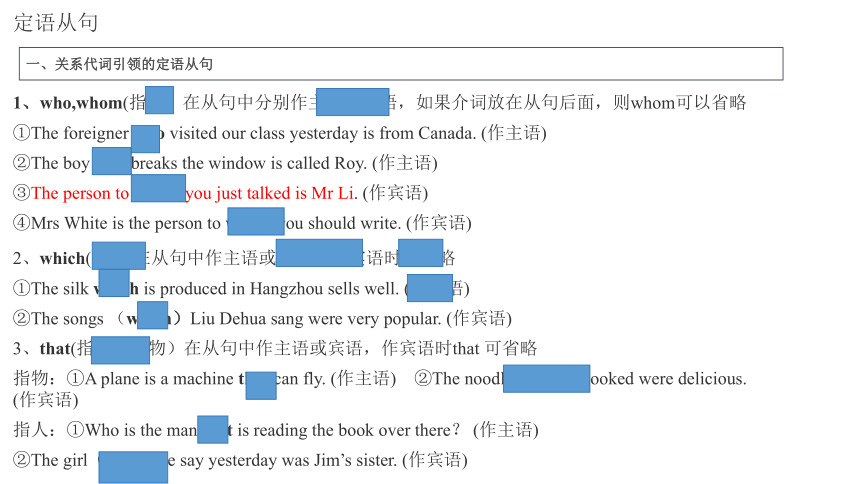
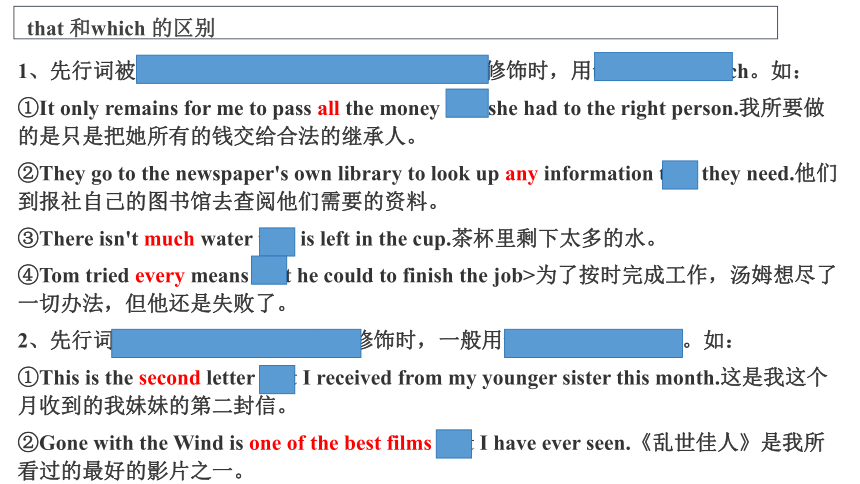

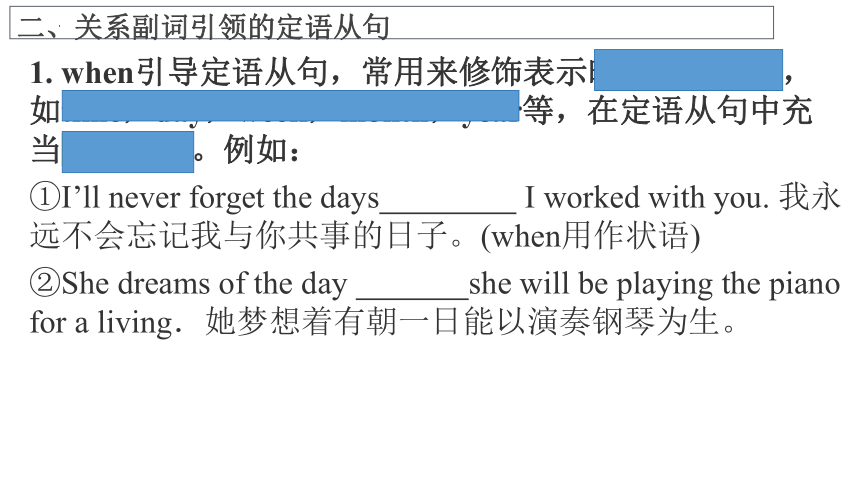
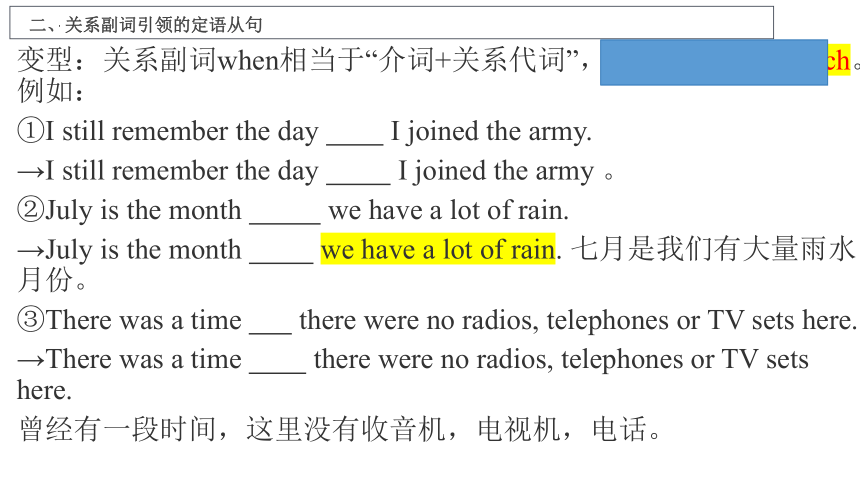

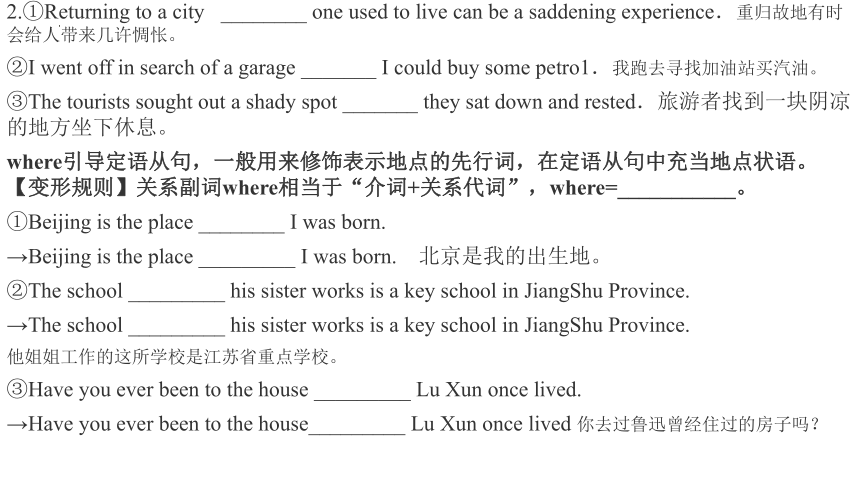
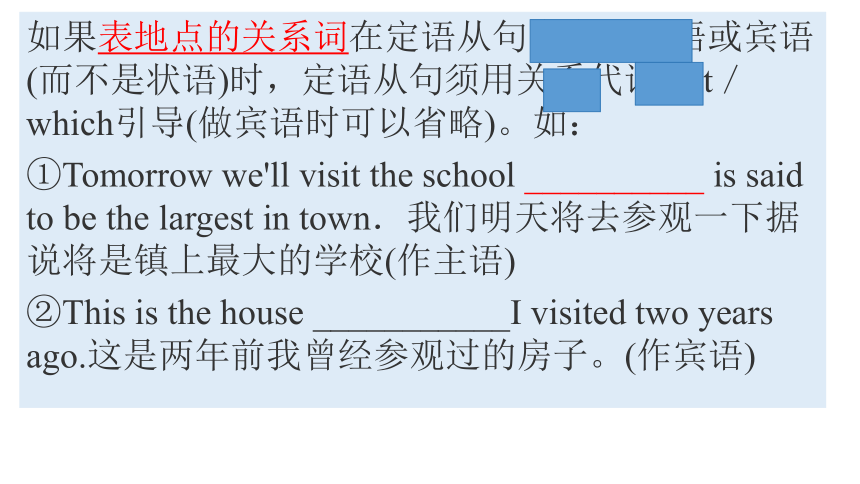
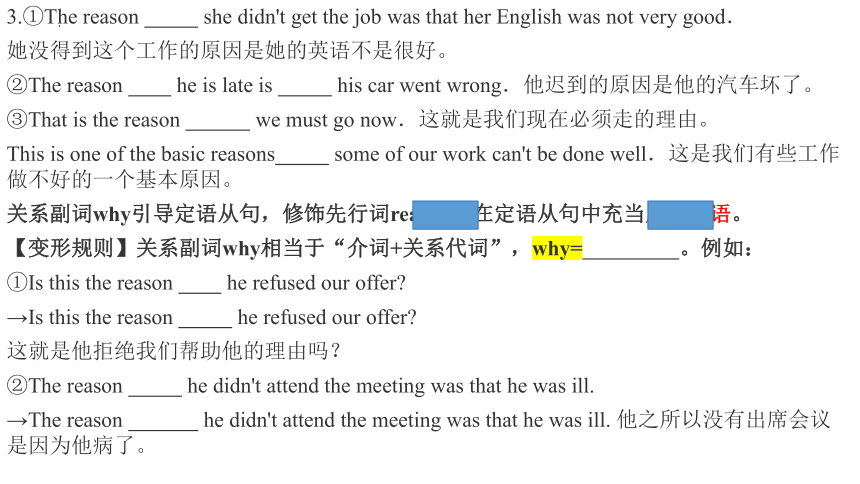
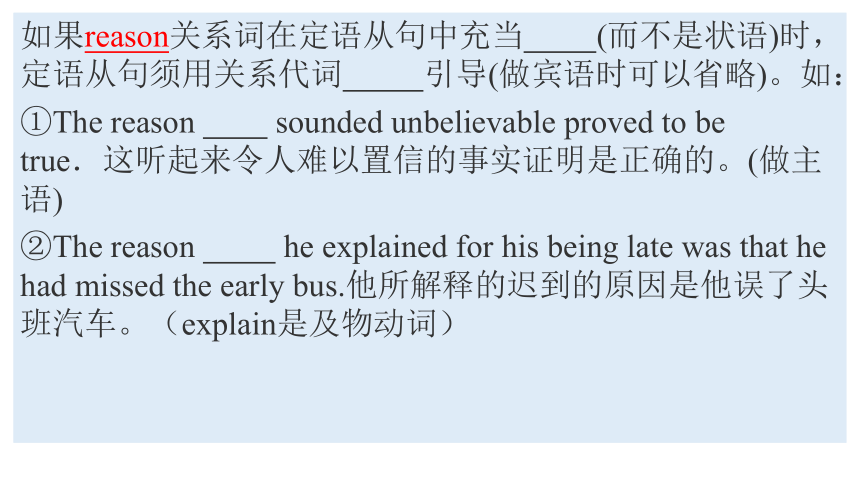
文档简介
(共61张PPT)
Part A: Have a try: Choose a proper conjunction.
1. _____ has been announced is that we must hand in our graduation papers before the end of June.
What
2. ___ he always serves the people is well-known.
3. ____ the English evening will be held, on
Monday or Tuesday, has not yet been decided.
4. I want to know ____ he has told you.
5. Everything depends on _______ we have money.
6. That is _____ he didn’t come to the meeting.
7. The news ____ we won the game was exciting.
That
When
what
whether
why
that
定语从句
定语从句
一、关系代词引领的定语从句
1、who,whom(指人)在从句中分别作主语和宾语,如果介词放在从句后面,则whom可以省略
①The foreigner who visited our class yesterday is from Canada. (作主语)
②The boy who breaks the window is called Roy. (作主语)
③The person to whom you just talked is Mr Li. (作宾语)
④Mrs White is the person to whom you should write. (作宾语)
2、which(指物)在从句中作主语或宾语,作宾语时可省略
①The silk which is produced in Hangzhou sells well. (作主语)
②The songs (which)Liu Dehua sang were very popular. (作宾语)
3、that(指人、指物)在从句中作主语或宾语,作宾语时that 可省略
指物:①A plane is a machine that can fly. (作主语) ②The noodles (that) I cooked were delicious. (作宾语)
指人:①Who is the man that is reading the book over there? (作主语)
②The girl(that)we say yesterday was Jim’s sister. (作宾语)
that 和which 的区别
1、先行词被all, every, no, some, any, little, much修饰时,用that而不用which。如:
①It only remains for me to pass all the money that she had to the right person.我所要做的是只是把她所有的钱交给合法的继承人。
②They go to the newspaper's own library to look up any information that they need.他们到报社自己的图书馆去查阅他们需要的资料。
③There isn't much water that is left in the cup.茶杯里剩下太多的水。
④Tom tried every means that he could to finish the job>为了按时完成工作,汤姆想尽了一切办法,但他还是失败了。
2、先行词被序数词或形容词最高级修饰时,一般用that,而不用which。如:
①This is the second letter that I received from my younger sister this month.这是我这个月收到的我妹妹的第二封信。
②Gone with the Wind is one of the best films that I have ever seen.《乱世佳人》是我所看过的最好的影片之一。
3、先行词被修饰only, very, same, last时用that,而不用which。如:
①This is the only ticket I can find in my pocket.这是我口袋里所能找到的唯一一张票子了。
②That is the very magazine he is looking for.那正是他要找的那本杂志。
4、当有两或两个以上分别表示人或物的先行词时,这个定语从句要用 ,而不用引导whom,who,which。
He talked about the teachers and school he had visited.
他谈论他所拜访的老师和参观的学校。
二、关系副词引领的定语从句
1. when引导定语从句,常用来修饰表示时间的先行词,如time,day,week,month,year等,在定语从句中充当时间状语。例如:
①I’ll never forget the days I worked with you. 我永远不会忘记我与你共事的日子。(when用作状语)
②She dreams of the day she will be playing the piano for a living.她梦想着有朝一日能以演奏钢琴为生。
二、关系副词引领的定语从句
变型:关系副词when相当于“介词+关系代词”,when=in/on/at which。例如:
①I still remember the day I joined the army.
→I still remember the day I joined the army 。
②July is the month we have a lot of rain.
→July is the month we have a lot of rain. 七月是我们有大量雨水月份。
③There was a time there were no radios, telephones or TV sets here.
→There was a time there were no radios, telephones or TV sets here.
曾经有一段时间,这里没有收音机,电视机,电话。
二、关系副词引领的定语从句
如果表时间的关系词在定语从句中充当主语或宾语(而不是状语)时,定语从句须用关系代词that/which引导(做宾语时可以省略)。如:
①I was busy learning the computer science that summer was rather hot.我忙着学习计算机科学的这个夏天相当热。(作主语)
② Don’t forget the time I’ve told you. 不要忘记我告诉你的时间。(that用作told的宾语)
2.①Returning to a city ________ one used to live can be a saddening experience.重归故地有时会给人带来几许惆怅。
②I went off in search of a garage _______ I could buy some petro1.我跑去寻找加油站买汽油。
③The tourists sought out a shady spot _______ they sat down and rested.旅游者找到一块阴凉的地方坐下休息。
where引导定语从句,一般用来修饰表示地点的先行词,在定语从句中充当地点状语。【变形规则】关系副词where相当于“介词+关系代词”,where=___________。
①Beijing is the place ________ I was born.
→Beijing is the place _________ I was born. 北京是我的出生地。
②The school _________ his sister works is a key school in JiangShu Province.
→The school _________ his sister works is a key school in JiangShu Province.
他姐姐工作的这所学校是江苏省重点学校。
③Have you ever been to the house _________ Lu Xun once lived.
→Have you ever been to the house_________ Lu Xun once lived 你去过鲁迅曾经住过的房子吗?
如果表地点的关系词在定语从句中充当主语或宾语(而不是状语)时,定语从句须用关系代词that/which引导(做宾语时可以省略)。如:
①Tomorrow we'll visit the school __________ is said to be the largest in town.我们明天将去参观一下据说将是镇上最大的学校(作主语)
②This is the house ___________I visited two years ago.这是两年前我曾经参观过的房子。(作宾语)
3.①The reason she didn't get the job was that her English was not very good.
她没得到这个工作的原因是她的英语不是很好。
②The reason he is late is his car went wrong.他迟到的原因是他的汽车坏了。
③That is the reason we must go now.这就是我们现在必须走的理由。
This is one of the basic reasons some of our work can't be done well.这是我们有些工作做不好的一个基本原因。
关系副词why引导定语从句,修饰先行词reason,在定语从句中充当原因状语。
【变形规则】关系副词why相当于“介词+关系代词”,why= 。例如:
①Is this the reason he refused our offer
→Is this the reason he refused our offer
这就是他拒绝我们帮助他的理由吗?
②The reason he didn't attend the meeting was that he was ill.
→The reason he didn't attend the meeting was that he was ill. 他之所以没有出席会议是因为他病了。
如果reason关系词在定语从句中充当 (而不是状语)时,定语从句须用关系代词 引导(做宾语时可以省略)。如:
①The reason sounded unbelievable proved to be true.这听起来令人难以置信的事实证明是正确的。(做主语)
②The reason he explained for his being late was that he had missed the early bus.他所解释的迟到的原因是他误了头班汽车。(explain是及物动词)
三、限制性定语从句和非限制性定语从句
相同点:都属于定语从句
不同点:① 形式上:限制性定从 逗号;非限制性定从 逗号。
② 意义上:限制性定从对先行词起 作用;非限制性定从起 作用。
③关系词:非限制性定从不能用_____________.
He has found the book he was looking for.
Yesterday I met Li Ping, seemed to be very busy.
He told me a story yesterday, I think is very interesting. (which指a story)
Tom has made great progress, makes me very happy. (which指逗号前面整句话意思)
由as引导的非限制性定语从句
三、限制性定语从句和非限制性定语从句
由as引导的非限制性定语从句
as与which都可用来引导非限制性定语从句,来指代整个主句的内容。当非限制性定语从句位于句末且as或which在从句中作主语、宾语或表语时,两者常可互换。
He married her, was natural.(作主语)
他和她结婚了,这是很自然的事。
He is an old kind farmer, anybody can see.(作宾语)
任何人都能看得出来,他是一位善良的老农民。
由as引导的非限制性定语从句
She is a little poor in English, makes her parents a little worried.
He failed in the experiment, was unexpected.
is known to all Diaoyu Island belongs to China.
is expected,he has been admitted to Beijing University.
as用于定语从句:such+名词+as… 像…一样的,像…之类的;the same+名词+as… 和…同样的
其中as可作为关系代词在从句中充当主语、宾语或表语。
1.We have found such materials are used in their factory.
我们已经找到了像他们工厂里用的那种材料。(as作 语)
2.These houses are sold at such a low price people expected.
这些房子以人们预料的那样的低价出售。(as作____语)
3.He is not the same man he was.
他和过去不同了。(as作_______语)
注意 such…as…引导的定语从句与such…that…引导的状语从句的区别:
He is such a clever boy _______ everyone likes.(定语从句-缺少成分him)
他是一个人人都喜爱的聪明孩子。
He is such a clever boy ________ everyone likes him. (状语从句-不缺少成分)
他是一个如此聪明的孩子,以至于人人都喜爱他。
四、定语从句中的主谓一致
1、
That is one of the books that _____ (be)required for study at school. 那是学校里要求学生学习的书籍之一。
This is one of the most wonderful novels that _______ (be)published since 1990. 这是自1990年以来出版的最精彩的小说之一。
She is one of the few persons who _____ (know)Spanish. 她是懂得西班牙语的少数几个人中的一位。
This is one of the most famous plays that (write) in the thirties. 这是30年代写的最著名的剧本之一。
2、
He is the one of the teachers who ______(know) French in our school. 他是我校教师中惟一懂法语的人。(修饰the one) He is one of the teachers who ________(know) French in our school.他是我校懂法语的教师之一。(修饰the teachers)
This is the only one of the rooms that _______(be) free now. 这是这些房间中惟一没人住的一间。(修饰the only one) This is one of the rooms that ________(be)free now.
这是目前没人住的房间之一。(修饰rooms)
one of the + 复数名词:从句谓语动词通常用 形式,跟定语从句所靠近的那个复数名词在数上保持一致。
如果one of the + 复数名词这一结构前面带有定冠词或the only之类的限定语,后面定语从句中的谓语动词则要用 形式,这是因为定语从句在意义上修饰的是the one或the only one,而不是那个复数名词。如:
课后练习
1.This is the best factory ____we visited last year .
A. where B. which C. in which D. that
2.Is this the factory ____computers are built
A. that B. which C. in which D. in that
3.please pass me the dictionary ____cover is red .
A. whose B.its C. which D. which of
4.The man ____has arrived .
A. whom I told you B. that I told you
C. whom I told you about him D. I told you about
5. Do you know the comrade ____we are talking
A. to whom B. to who C. whom D. to that
6. They visited the house ___the great writer was born .
A. from where B. in which C. which D. in where
7. The comrade ___is speaking at the meeting is my teacher .
A. whom B. which C. who D. whose
8. He asked us to watch carefully everything ___he did in class .
A. who B. that C. what D. where
9. I’ll visit the professor tomorrow ,___ will be back from Shanghai .
A. who B. that C. when D. which
10.The school ___I study is a new one .
A. on which B. at where C. on that D. at which
课后练习
11.His parents wouldn’t let him marry anyone ______ family was poor.
A.of whom B.whom C.of whose D.whose
12.She heard a terrible noise, _______ brought her heart into her mouth.
A.it B.which C.this D.that
13.In the dark street , there wasn’t a single person _____ she could turn for help.
A.that B.who C.from whom D.to whom
14.The weather turned out to be very good , ____ was more than we could expect.
A.what B.which C.that D.it
15.After living in Pairs for fifty years he returned to the small town ____ he grew up as a child.
A.which B.where C.that D.when
16.Carol said the work would be done by October,______personally I doubt very much.
A. it B.that C.when D.which
17.Dorothy was always speaking highly of her role in the play, ________,of course , made the others unhappy.
A.who B.which C.this D.what
18.Recently I bought an ancient Chinese vase , _____ was very reasonable.
A.which price B.the price of which C.its price D.the price of whose
19._____ has already been pointed out , grammar is not a set of dead rules.
A.As B.It C.That D.Which
20.He lived in London for 3 months , during ____ time he learned some English.
A.this B.which C.that D.same
9. I’ll visit the professor tomorrow ,___ will be back from Shanghai .
A. who B. that C. when D. which
I’ll visit the professor tomorrow ,___ he will be back from Shanghai .
A. who B. that C. when D. which
03
状语从句
地点状语从句
01
连接词:where, wherever, everywhere, anywhere
例句:1.When you read the book, you’d better make a mark where you have any questions.
2.Wherever you are, whatever you do, I will be right here waiting for you.
3.Wherever you work, you will gain much valuable experience as long as you are willing to work.
4.Everywhere they went, they were warmly received.
5.You’d better not leave the medicine_____ kids can get at it.
A.even if B.which C.where D.so that
6._____you go,don’t forget your people.
A.Whenever B.However C.Wherever D.Whichever
原因状语从句
02
连接词:because, since, as, for, now that, in that, seeing that, considering that, given that, considering that
because, since,as和for
(1) the weather is so bad, we have to delay our journey.
(2)He is absent today, he is ill.
He must be ill, he is absent today.
now that:“既然” in that:“因为”,通常只能放于句中,强调重要的、唯一的原因。
Now that everybody has come,let’s begin our conference.
Human beings are different from animals in that humans can speak and think.
Considering that he is no more than 12 years old, his height of 1.80 m is quite remarkable.
owing to,due to,thanks to,as a result of属于连词短语,后面只能接词或短语,不能接从句。
原因状语从句
02
连接词:because, since, as, for, now that, in that, seeing that, considering that, given that, considering that
练习:We’d better hurry_____it is getting dark.
A.and B.but C.as D.unless
He found it increasingly difficult to read,_____his eyesight was beginning to fail. A.and B.for C.but D.or
Hydrogen(氢元素) is the fundamental element of the universe_____it provides the building blocks from which the other elements are produced.
A.so that B.but that C.in that D.provided that
条件状语从句
03
连接词:if, unless, as/so long as, if only(要是), providing/provided that, suppose that, in case that(万一,如果), on condition that
1. you cheat in the exam, you’ll never get away with it. 考试作弊必予追究。
2. you go at once ,you will be late. 如果你不马上走,就会迟到的。
3.I’ll remember that day I live. 只要我活着,我就不会忘记那个日子。
4. I forget, please remind me about it. 万一我忘记,请提醒我一下。
5.He will succeed only he does his best.
5、条件状语从句的时态:当主句为将来时态或含有将来意义时,①条件状语用一般现在时( );
②如果引导的条件和事实相反,则用________________________.
3.But if it rains tomorrow, I_____(stay) at home.
4.She will sing a song if she________( ask).
5.If I were a bird, I __________(fly).
6.Suppose (that) he does not come, what ________ we do
7.You _______(miss) the train unless you hurry up.
8.If it had not been for your help yesterday,I could not _____(catch) the bus.
9.If I knew his telephone number,I _________(tell) you.
如果我知道他的电话号码,我就会告诉你。(事实:不知道)。
Choked with overwhelming gratitude, the little girl’s mother held Chrissy’s hands tightly,without whose responsibility she could have missed her love.
虚拟语气
语气和时态、语态一样,是动词的一种表达形式,表示说话者的目的和意图。英语中有四种语气:陈述语气、疑问语气、祈使语气和虚拟语气。
陈述语气是用来陈述一个事实或提出一种想法的语气。例如:
I went to the theatre yesterday. 我昨天去剧院了。
疑问语气是用来提出问题或询问情况的语气。例如:
Are you the headmaster of the school 你是这所学校的校长吗
祈使语气用来表示请求、邀请、忠告、指示、警告或命令等。例如:
Don’t touch anything on the table. 不要碰桌子上的任何东西。
虚拟语气用来表示说话人的主观愿望或假想,所说的不一定是事实,或者是与事实相反的情况。虚拟语气主要用于条件状语从句和名词性从句中。
条件句分为真实条件句和虚拟条件句。真实条件句所表示的假设有可能会实现,如:You will miss the train unless you hurry up.(你会错过火车的,除非你快点。)而虚拟条件句所表示的假设是不可能或不大可能发生的。
知识精讲
知识点一 主语从句中的虚拟语气
在以下句型的主语从句中,谓语动词要用虚拟语气形式,即:should+动词原形(should可省略) 。
1. It is+形容词+that+主语+(should)+动词原形…
常用于此句型的形容词有:important, necessary, strange, better, natural, surprising, anxious, essential, regretful等。例如:
It is important that we (should) make full use of our mineral resources. 对我们来说,充分利用我国的矿产资源是重要的。
It is necessary that the work (should) be done. 这工作必须立即完成。
It is strange that he (should) say so. 他居然会这样说,真是奇怪。
2. It is+动词的过去分词+that+主语+(should)+动词原形…
常用于此句型的过去分词主要有:一个坚持(insisted);两个命令(ordered, commanded);三个建议(advised, suggested, proposed);四个要求(demanded, required, requested,desired)等。例如:
It is suggested that you (should) join more club activities in college.
建议你在大学里多参加社团活动。
It is demanded that we (should) work out a plan. 要求我们制订一个计划。
It is recommended that he (should) visit there. 推荐他去那里游览。
知识点二 虚拟条件状语从句中的虚拟语气 1. 虚拟语气在if虚拟条件句中的用法
虚拟条件句的基本类型 虚拟条件句结构 主句结构 例句
与现在事实相反 if+主语+动词过去式(be用were) 主语+should/would /might/could+do If you ________(come)across her on the street now, you might not recognize her. 现在如果你在街上遇到她,也许就认不出她了。
If he were free, he __________(help us.要是他有空的话,他会帮助我们的。
与过去事实相反 if+主语+had done 主语+should/would /might/could+have done If he had been in that train then, he might ________(kill) in that accident.
与将来事实相反 if+主语+动词过去式(be用were); if+主语+were to+do;if+主语+should do 主语+should/would /might/could+do If he came here, he ______(tell) us about it.
2. 虚拟语气在含蓄条件句中的用法
有时虚拟或假设的条件不以if引导的条件句形式表现出来,而是通过一个介词短语、副词或其他形式表示。这时,谓语动词仍然要用虚拟语气形式。常用的表示含蓄虚拟的词或短语有:otherwise(要不然), with, without, under, but, but for(要不是)等。例如:
I was ill that day. Otherwise, I ____________ part in the sports meeting.那天我病了。否则,我就参加运动会了。
Without water, fish ___________ die. 离开水,鱼儿就会死掉。
But for your help, we could not ___________________(succeed).
要不是你帮忙,我们就不会成功。
would have taken
could/would
have succeeded
2. 虚拟语气省略if的用法
在if引导的条件状语从句中,如果有were, had, should, could等,可以省略if,而把were, had, should, could等置于句首,变为倒装句式。注意否定词not不能放在前面。例如:
If I were you, I would accept his advice. 如果我是你,我会接受他的建议。
→ Were I you, I would accept his advice.
If it should rain tomorrow, I would stay at home. 如果明天下雨,我会待在家里。
→ Should it rain tomorrow, I would stay at home.
If you had studied hard before, you would have passed the exam.
如果你之前努力学习,你已经通过考试了。
→ Had you studied hard before, you would have passed the exam.
If I could fly, I would go and see you right now. 如果我会飞,我立刻去看你。
→ Could I fly, I would go and see you right now.
1. If the bus to the airport hadn’t been late, we ________ the plane.
A. caughB. had caughtC. would catchD. would have caught
2. If the new safety system _________ to use, the accident would never have happened.
A. had been put B. were put C. should be put D. would be put
剖析 考查虚拟语气。句意为:“如果去机场的巴士没晚,我们就赶上航班了。”if引导虚拟条件句时,可对现在、过去或将来的事实表示虚拟。根据句意可知,本句是对过去事实的虚拟和假设,虚拟条件句用“if+主语+had done”,主句应用“主语+would/could/should/might+have done”。故选D。
剖析 考查虚拟语气。句意为:“如果这个新的安全系统被投入使用的话,这个事故就不会发生了。” 主句是对过去情况的虚拟,所以从句谓语用 had done 形式,根据句意可知是被动,要用被动语态,故选A。
时间状语从句
04
连接词:when, as, while, as soon as, while, before, after, since , till, until,the minute, the moment, the second, every time, the day,the instant, immediately , directly, no sooner … than, hardly …when, scarcely … when
1.__________ 即可引导一个持续动作,也可引导一个短暂动作
________ a drop of ink falls into a glass of clear water ,the water will immediately changes its color and can’t be drunk.
3._________ 可表示从句和逐句的两个动作交替进行伙同是发生,可译为“一边…… 一边……”或“随着……”
Take man for example ,a wise person has a good temperament , being tolerant of others ________he humbles himself.
2.__________引导的动作必须是持续性的。
__________the raw ears of wheat are making their way up , the
mature ears of wheat hang their heads.
when / while / as
1) I________( tell )her the good news when he comes back.
2)While my husband is cooking, I __________(watch) TV.
3) time went by, the days became shorter and shorter.
We'll start ______ the captain comes.
You can go swimming ______ I am having lunch.
____ he grew older,he became less active.
_______________ I was waiting at the bus stop.
I came across an old friend of mine.
用when, while,as填空
when
while
As
When/While/As
当……的时候
when
一边…… 一边……
as
当……的时候;这时突然
as time went by
be about to do …when…
be doing …when…
be on the point of doing…when…
had just done …when…
I was about to leave my office when the telephone rang.
I had just finished my report when someone knocked at the door.
I was on the point of going out when the phone rang.正当我要出去的时候电话响了。
= with time going by
(2)after和before的用法
1.after 意为“在......之后”
He changed his idea after he thought it over.
He changed his idea after thinking it over.
(2)after和before的用法
2.before意为“在......之前;还没......就......;......才......;还没来得及......”
It will (not) be +一段时间+before...
(没有)过......时间才......
It was not long before... 不久......就......
It was+时间段+before... 过了......(时间)才......
I had finished my dissertation ______ my supervisor went abroad.
在我的导师出国之前,我已完成了我的学位论文。
It will be many years_______ we meet again.
可能要过许多年我们才能再见了。
before
before
It was three days before he came back.
Someone called me up in the middle of the night, but he hung up I could answer the phone.
有人深更半夜给我打电话,但我还没来得及接对方就挂断了。
他三天后回来。
before
(3)since的用法
I haven't heard from him since he _____(leave).
他走之后,我还没收到过他的信。
①since意为“自从……”,引导的时间状语从句
主句用____________________,
从句用______________
一般过去时
现在完成时
left
常用句型:It is/has been十一段时间+since...
It is two years since the war broke out.
1.一 旦
2.倒装
once
Hardly had sb done…when sb did…
No sooner had sb done…than sb did…
一…… 就……
3.“ly ”
immediately
directly
instantly
4.The + n
the + minute
the + second
the + moment
the +instant
注意:no sooner ...than, hardly ...when一…就, 从句用过去完成时,主句用一般过去时(否定词在句首,后面的句子需要部分倒装)
1.Hardly had he seen me he ran away. 他一看见我就跑了。
2.No sooner had they reached home it rained more and more heavily.他们一到家,雨就越下越大起来。
3.一听到Chrissy 话,女孩的妈妈和警察立刻转过身并冲向篱笆处。(用no sooner ..than/ hardly ..when)
than
when
No sooner had they heard Chrissy’s words than the
girl’s mother and the policemen turned around and
rushed towards the fence.
(3)直到...... :till/until
1.We didn’t go home until we finished our work.(改成倒装)
换成倒装句:_____________________________________________
2.I didn’t realize she was a famous film star until she took off her dark glasses(改成倒装)
换成倒装句:_____________________________________________
3.Not until I began to work did I realize how much time I had wasted(改成正常语序)
换成:______________________________________________
4.强调句式:
It is not until 8 o'clock he didn’t do homework.他直到8点才写作业
Not until we finised our work did we go home.
Not until she took off her dark glasses did I realize
she was a famous film star.
I didn’t realize how much time I had wasted until I began to work.
that
(6)其他常见的引导时间状语从句的连词(短语)还有
each time, every time, next time, the first/last time, any time, by the time, whenever等
名词短语用作连词,引导时间状语从句,表示“每当......;每次......;下次......”
___________ you come back, we will have finished the job.
到你回来的时候,我们将已经完成这项工作。
__________ we met with difficulties, they came to help us.
每当我们遇到困难,他们就来帮忙。
You can call me _________ you want to.
任何时候你想给我打电话都可以打。
By the time
Whenever
any time
结果状语从句
05
连接词:so... that,such...that.
1.Tom is kind that they all like to make friends with him.
换成倒装句:__________________________________________________
2.The piano costs much money that Linda can’t afford it.
换成倒装句:__________________________________________________
3.The activity is meaningful that teachers and students all thinkly of it.
换成倒装句:__________________________________________________
4.Kathy is a lovely girl that we all like to play with her.
换成倒装句:__________________________________________________
So...that...引导结果状语从句时,从句结果是否定句,可与too...to...结构进行转换。
They were so tired that they couldn't go any father
They were tired go any farther. 他们累得不能再走了。
当“so/such …. that …”结构中的so,such连同它所直接修饰的成分共同位于句首表示强调时,主句要进行倒装(that后面的结果状语从句不倒装)。
so
So kind was Tom that they all like to make friends with him.
So much money does the piano cost that Linda can’t afford it.
so
so
So meaningful is the activity that teachers and students all thinks highly of it.
such
Such a lovely girl is Kathy that we all like to play with her.
too
to
让步状语从句,表尽管、即使
06
though,although,as, while; even if,even though; whether...or...; no matter+疑问词,疑问词+ever
1、 he was exhausted,(still) he kept on working.
2.Object you may,I’ll go.(=Though/Although you may object,I’ll go.)
3.Hard he works,he makes little progress. (=Though he works hard,he makes little progress.)
4.Child he was,he knew what was the right thing to do.(=Though he was a child,he knew what was the right thing to do.)
表语的名词、形容词,或修饰谓语动词的副词放在从句谓语之前。当作表语的单数可数名词位于句首时,名词前的不定冠词要省略
Although/Though/ Evern if/Even though
as/though
as/though
as/though
2、While
① 表示尽管,虽然,用法与although类似
While (he is) respected, the mayor is not liked.
He made a comment that, while well-intentioned, still hurt my feelings.
While I think some parts of the plan are good, I don't think it's practical.
② 表示主从句信息不同点对比
While some people think his comedy is funny, others find him offensive.
③ 表示当...时候 ,引导时间状语从句,从句中的动词必须是延续性动词
Someone called while you were out.
You can get the photos developed while you are waiting.
4、“no matter+疑问词”vs“疑问词-ever”的含义为“……都……;不管……都……”
它们引导的让步状语从句可以互换。例如:
happened, he would not mind. (=Whatever happened, he would not mind.)
无论发生了什么事情,他都不会介意的。
you are, you must keep the law.(=Whoever you are, you must keep the law.)
不管你是 谁,你都需要遵纪守法。
When anyone does something for you, small and no matter whether he's a superior or servant, it's proper to say“Thank you”.
只要任何人替你做了一件事,不管事情多么微不足道,也不管他是你的上司还是你的仆人,你都应该说声“谢谢”。
但“no matter+疑问词”结构只能引导让步状语从句,而“疑问词-ever”还可以引导名词性从句。例如:
Whatever (=No matter what) you say,I won’t believe you. (Whatever 引导让步状语句)
无论你说什么,我都不会相信你。
I'll eat whatever(≠no matter what) you give me. (whatever引导宾语从句)
你给我吃什么,我就吃什么。
Whoever comes will be welcome. (Whoever引导主语从句) 不管谁来都受到欢迎。
5、表示让步关系的介词短语:regardless of, despite=in spite of +名词短语/同位语从句。
He runs every day regardless the weather. [=he runs every day no matter what the weather is like]
Despite [= ] our objections, he insisted on driving.
She ran the race an injury.
The law has yet to be passed, the fact that most people are in favor of it.6、whether...or...表示“不论是否……”,“不管是……还是……”之意。
旨在说明正反两方面的可能性都不会影响主句的意向或结果,所以它的语气是比较强烈的,从而也更加坚定了主句的内容。例如:
You'll have to attend the ceremony you're free or busy.
不管你忙不忙,都要参加这个典礼。
you believe it or not, it's true. 无论你是否相信,这都是真的。
or not they win this battle, they won't win the war.
不管他们是否能赢得这次战役,他们绝不会赢得这场战争。
方式状语从句
07
连接词:as, as if, as though, 就像,好像…似的
1.Always do to the others you would be done by.
2.When in Rome, do the Romans do.
3.They completely ignore these facts as if (as though) they never ________(exist)).
他们完全忽略了这些事实,就仿佛它不存在似的。(与事实相反,谓语用虚拟语气。)
4. The old lady treats the boy as if he _____(be) her own son.
5.He talks as if(as though)he__________(know) all about it.
6.Hearing what I said, Tom rushed out the room as if there_________a spring under his feet.
目的状语从句
08
连接词:so that, in order that,为了,以便
1.in order that引导的从句可置于句首,也可置于句尾,而so that引导的从句往往只置于句尾。
在目的状语从句中常常用情态动词may/might/will/would/shall/should/can/could等。
I could be in time for the wonderful TV programs,I hurried through my work.
Speak louder the people in the hall can all hear you.
Take this medicine you can recover soon.
2.in case的用法:in case 意为“以防,以免”。
Take a hat with you the weather is very hot.
I stayed all day at home you called.
当主从句主语一致时,目的状语从句可与不定式或in order to 可以和so as to短语转换。
He worked day and night in order that /so that he could make more money.
He worked day and night make more money.
比较状语从句
08
连接词:as(同级比较),than(不同程度的比较);特殊引导词:the more … the more … 越…越…; no … more than;not A so much as B引导的.
结构 例句 结构 例句
as/so + 原级 + as 和…一样 My clothes is as/so beautiful as yours. 我的衣服和你的一样美。 not so + 原级 + as 不如,不及 The story is not so interesting as the one .
这个故事不如那个故事有意思.
比较级 + than 比...优上 Our school is bigger than yours. 我们学校的规模比你们的大. less + 原级 + than 不如,比...较差 This kind of coat is less expensive than that one。这款大衣不如那一款贵
no + 比较级 + than 最多和......一样,只不过 I have no more than two dollars left in my pocket. 我口袋里只剩下两元钱了.(有钱少的含义) not more than,不多于 I have not more than two dollars left in my pocket.
我口袋里顶多还有两元钱.(没有钱多钱少的含义)
no less than 不亚于,至少和...一样 He has got no less dollars than he did last time. 他收到的钱不亚于他上次收到的.(有收到多的含义) not less than 不少于 He has got not less dollars than he did last time.
他收到的钱不少于他上次收到的.(不包含多或少的含义)
the 比较级 + the 比较级,越如何就越如何 The more we can do for you, the happier we will be. 为你们做得越多我们就越感到高兴. not A so much as B 与其说A不如说B He is not so much a journalist as a writer.与其说他是个新闻工作者,不如说他是个作家
课后练习
1. When (visit) London, I like to travel by bus.
2. Hardly had we begun our walk it began to rain.
3. How long is it we visited your mother
4. We listened eagerly, he brought news of our families.
5. she goes, there are crowds of people waiting to see her.
6. angry was she that she couldn't speak.
7. Only if a teacher has given permission (be)a student allowed to enter this room.
8. Young I am, I already know what career I want to follow.
When时间状语从句
hardly…when 引导的时间状语从句
since 引导的时间状语从句
for引导的原因状语从句
Wherever 引导的地点状语从句
so…that 引导的结果状语从句
Only if 引导的条件状语从句
as 引导的让步状语从句
1. There was never any time for Kate to feel lonely, although/though she was an only child.
2. The research is so designed that once begun(begin), nothing can be done to change it .
3. When a pencil is partly in a glass of water, it looks as if it _were broken___(break) .
4. Not until all the fish died in the river __did we realize___ (we realize) how serious the pollution was.
5. --- Did Linda see the traffic accident
--- No, no sooner _had she_gone__ (she goes) than it happened.
6. Half an hour later, Lucy still couldn't get a taxi _where__ the bus had dropped her.
7. Hardly had I finished my composition _when__ the bell rang.
8. He did the experiment _as_ he was told.
9. If we work with a strong will, we overcome any difficulty, however / no matter how great it is.
10. They’ll stand by you even_if you don’t succeed.
11. Today, we will begin where we stopped yesterday so that no point will be left out.
12. The meaning of the word “nice” changed a few times before it finally came to include the sense “pleasant”.
13. You will never gain success _unless_you are fully devoted to your work.
14. Parents should take seriously their children’s requests for sunglasses because eye protection is necessary in sunny weather.
15. As is reported, it is 100 years since Qinghua University was founded.
16. Leave your key with your neighbor in case you lock yourself out one day.
17. One’s life has value as long as/so long as one brings value to the life of others.
Part A: Have a try: Choose a proper conjunction.
1. _____ has been announced is that we must hand in our graduation papers before the end of June.
What
2. ___ he always serves the people is well-known.
3. ____ the English evening will be held, on
Monday or Tuesday, has not yet been decided.
4. I want to know ____ he has told you.
5. Everything depends on _______ we have money.
6. That is _____ he didn’t come to the meeting.
7. The news ____ we won the game was exciting.
That
When
what
whether
why
that
定语从句
定语从句
一、关系代词引领的定语从句
1、who,whom(指人)在从句中分别作主语和宾语,如果介词放在从句后面,则whom可以省略
①The foreigner who visited our class yesterday is from Canada. (作主语)
②The boy who breaks the window is called Roy. (作主语)
③The person to whom you just talked is Mr Li. (作宾语)
④Mrs White is the person to whom you should write. (作宾语)
2、which(指物)在从句中作主语或宾语,作宾语时可省略
①The silk which is produced in Hangzhou sells well. (作主语)
②The songs (which)Liu Dehua sang were very popular. (作宾语)
3、that(指人、指物)在从句中作主语或宾语,作宾语时that 可省略
指物:①A plane is a machine that can fly. (作主语) ②The noodles (that) I cooked were delicious. (作宾语)
指人:①Who is the man that is reading the book over there? (作主语)
②The girl(that)we say yesterday was Jim’s sister. (作宾语)
that 和which 的区别
1、先行词被all, every, no, some, any, little, much修饰时,用that而不用which。如:
①It only remains for me to pass all the money that she had to the right person.我所要做的是只是把她所有的钱交给合法的继承人。
②They go to the newspaper's own library to look up any information that they need.他们到报社自己的图书馆去查阅他们需要的资料。
③There isn't much water that is left in the cup.茶杯里剩下太多的水。
④Tom tried every means that he could to finish the job>为了按时完成工作,汤姆想尽了一切办法,但他还是失败了。
2、先行词被序数词或形容词最高级修饰时,一般用that,而不用which。如:
①This is the second letter that I received from my younger sister this month.这是我这个月收到的我妹妹的第二封信。
②Gone with the Wind is one of the best films that I have ever seen.《乱世佳人》是我所看过的最好的影片之一。
3、先行词被修饰only, very, same, last时用that,而不用which。如:
①This is the only ticket I can find in my pocket.这是我口袋里所能找到的唯一一张票子了。
②That is the very magazine he is looking for.那正是他要找的那本杂志。
4、当有两或两个以上分别表示人或物的先行词时,这个定语从句要用 ,而不用引导whom,who,which。
He talked about the teachers and school he had visited.
他谈论他所拜访的老师和参观的学校。
二、关系副词引领的定语从句
1. when引导定语从句,常用来修饰表示时间的先行词,如time,day,week,month,year等,在定语从句中充当时间状语。例如:
①I’ll never forget the days I worked with you. 我永远不会忘记我与你共事的日子。(when用作状语)
②She dreams of the day she will be playing the piano for a living.她梦想着有朝一日能以演奏钢琴为生。
二、关系副词引领的定语从句
变型:关系副词when相当于“介词+关系代词”,when=in/on/at which。例如:
①I still remember the day I joined the army.
→I still remember the day I joined the army 。
②July is the month we have a lot of rain.
→July is the month we have a lot of rain. 七月是我们有大量雨水月份。
③There was a time there were no radios, telephones or TV sets here.
→There was a time there were no radios, telephones or TV sets here.
曾经有一段时间,这里没有收音机,电视机,电话。
二、关系副词引领的定语从句
如果表时间的关系词在定语从句中充当主语或宾语(而不是状语)时,定语从句须用关系代词that/which引导(做宾语时可以省略)。如:
①I was busy learning the computer science that summer was rather hot.我忙着学习计算机科学的这个夏天相当热。(作主语)
② Don’t forget the time I’ve told you. 不要忘记我告诉你的时间。(that用作told的宾语)
2.①Returning to a city ________ one used to live can be a saddening experience.重归故地有时会给人带来几许惆怅。
②I went off in search of a garage _______ I could buy some petro1.我跑去寻找加油站买汽油。
③The tourists sought out a shady spot _______ they sat down and rested.旅游者找到一块阴凉的地方坐下休息。
where引导定语从句,一般用来修饰表示地点的先行词,在定语从句中充当地点状语。【变形规则】关系副词where相当于“介词+关系代词”,where=___________。
①Beijing is the place ________ I was born.
→Beijing is the place _________ I was born. 北京是我的出生地。
②The school _________ his sister works is a key school in JiangShu Province.
→The school _________ his sister works is a key school in JiangShu Province.
他姐姐工作的这所学校是江苏省重点学校。
③Have you ever been to the house _________ Lu Xun once lived.
→Have you ever been to the house_________ Lu Xun once lived 你去过鲁迅曾经住过的房子吗?
如果表地点的关系词在定语从句中充当主语或宾语(而不是状语)时,定语从句须用关系代词that/which引导(做宾语时可以省略)。如:
①Tomorrow we'll visit the school __________ is said to be the largest in town.我们明天将去参观一下据说将是镇上最大的学校(作主语)
②This is the house ___________I visited two years ago.这是两年前我曾经参观过的房子。(作宾语)
3.①The reason she didn't get the job was that her English was not very good.
她没得到这个工作的原因是她的英语不是很好。
②The reason he is late is his car went wrong.他迟到的原因是他的汽车坏了。
③That is the reason we must go now.这就是我们现在必须走的理由。
This is one of the basic reasons some of our work can't be done well.这是我们有些工作做不好的一个基本原因。
关系副词why引导定语从句,修饰先行词reason,在定语从句中充当原因状语。
【变形规则】关系副词why相当于“介词+关系代词”,why= 。例如:
①Is this the reason he refused our offer
→Is this the reason he refused our offer
这就是他拒绝我们帮助他的理由吗?
②The reason he didn't attend the meeting was that he was ill.
→The reason he didn't attend the meeting was that he was ill. 他之所以没有出席会议是因为他病了。
如果reason关系词在定语从句中充当 (而不是状语)时,定语从句须用关系代词 引导(做宾语时可以省略)。如:
①The reason sounded unbelievable proved to be true.这听起来令人难以置信的事实证明是正确的。(做主语)
②The reason he explained for his being late was that he had missed the early bus.他所解释的迟到的原因是他误了头班汽车。(explain是及物动词)
三、限制性定语从句和非限制性定语从句
相同点:都属于定语从句
不同点:① 形式上:限制性定从 逗号;非限制性定从 逗号。
② 意义上:限制性定从对先行词起 作用;非限制性定从起 作用。
③关系词:非限制性定从不能用_____________.
He has found the book he was looking for.
Yesterday I met Li Ping, seemed to be very busy.
He told me a story yesterday, I think is very interesting. (which指a story)
Tom has made great progress, makes me very happy. (which指逗号前面整句话意思)
由as引导的非限制性定语从句
三、限制性定语从句和非限制性定语从句
由as引导的非限制性定语从句
as与which都可用来引导非限制性定语从句,来指代整个主句的内容。当非限制性定语从句位于句末且as或which在从句中作主语、宾语或表语时,两者常可互换。
He married her, was natural.(作主语)
他和她结婚了,这是很自然的事。
He is an old kind farmer, anybody can see.(作宾语)
任何人都能看得出来,他是一位善良的老农民。
由as引导的非限制性定语从句
She is a little poor in English, makes her parents a little worried.
He failed in the experiment, was unexpected.
is known to all Diaoyu Island belongs to China.
is expected,he has been admitted to Beijing University.
as用于定语从句:such+名词+as… 像…一样的,像…之类的;the same+名词+as… 和…同样的
其中as可作为关系代词在从句中充当主语、宾语或表语。
1.We have found such materials are used in their factory.
我们已经找到了像他们工厂里用的那种材料。(as作 语)
2.These houses are sold at such a low price people expected.
这些房子以人们预料的那样的低价出售。(as作____语)
3.He is not the same man he was.
他和过去不同了。(as作_______语)
注意 such…as…引导的定语从句与such…that…引导的状语从句的区别:
He is such a clever boy _______ everyone likes.(定语从句-缺少成分him)
他是一个人人都喜爱的聪明孩子。
He is such a clever boy ________ everyone likes him. (状语从句-不缺少成分)
他是一个如此聪明的孩子,以至于人人都喜爱他。
四、定语从句中的主谓一致
1、
That is one of the books that _____ (be)required for study at school. 那是学校里要求学生学习的书籍之一。
This is one of the most wonderful novels that _______ (be)published since 1990. 这是自1990年以来出版的最精彩的小说之一。
She is one of the few persons who _____ (know)Spanish. 她是懂得西班牙语的少数几个人中的一位。
This is one of the most famous plays that (write) in the thirties. 这是30年代写的最著名的剧本之一。
2、
He is the one of the teachers who ______(know) French in our school. 他是我校教师中惟一懂法语的人。(修饰the one) He is one of the teachers who ________(know) French in our school.他是我校懂法语的教师之一。(修饰the teachers)
This is the only one of the rooms that _______(be) free now. 这是这些房间中惟一没人住的一间。(修饰the only one) This is one of the rooms that ________(be)free now.
这是目前没人住的房间之一。(修饰rooms)
one of the + 复数名词:从句谓语动词通常用 形式,跟定语从句所靠近的那个复数名词在数上保持一致。
如果one of the + 复数名词这一结构前面带有定冠词或the only之类的限定语,后面定语从句中的谓语动词则要用 形式,这是因为定语从句在意义上修饰的是the one或the only one,而不是那个复数名词。如:
课后练习
1.This is the best factory ____we visited last year .
A. where B. which C. in which D. that
2.Is this the factory ____computers are built
A. that B. which C. in which D. in that
3.please pass me the dictionary ____cover is red .
A. whose B.its C. which D. which of
4.The man ____has arrived .
A. whom I told you B. that I told you
C. whom I told you about him D. I told you about
5. Do you know the comrade ____we are talking
A. to whom B. to who C. whom D. to that
6. They visited the house ___the great writer was born .
A. from where B. in which C. which D. in where
7. The comrade ___is speaking at the meeting is my teacher .
A. whom B. which C. who D. whose
8. He asked us to watch carefully everything ___he did in class .
A. who B. that C. what D. where
9. I’ll visit the professor tomorrow ,___ will be back from Shanghai .
A. who B. that C. when D. which
10.The school ___I study is a new one .
A. on which B. at where C. on that D. at which
课后练习
11.His parents wouldn’t let him marry anyone ______ family was poor.
A.of whom B.whom C.of whose D.whose
12.She heard a terrible noise, _______ brought her heart into her mouth.
A.it B.which C.this D.that
13.In the dark street , there wasn’t a single person _____ she could turn for help.
A.that B.who C.from whom D.to whom
14.The weather turned out to be very good , ____ was more than we could expect.
A.what B.which C.that D.it
15.After living in Pairs for fifty years he returned to the small town ____ he grew up as a child.
A.which B.where C.that D.when
16.Carol said the work would be done by October,______personally I doubt very much.
A. it B.that C.when D.which
17.Dorothy was always speaking highly of her role in the play, ________,of course , made the others unhappy.
A.who B.which C.this D.what
18.Recently I bought an ancient Chinese vase , _____ was very reasonable.
A.which price B.the price of which C.its price D.the price of whose
19._____ has already been pointed out , grammar is not a set of dead rules.
A.As B.It C.That D.Which
20.He lived in London for 3 months , during ____ time he learned some English.
A.this B.which C.that D.same
9. I’ll visit the professor tomorrow ,___ will be back from Shanghai .
A. who B. that C. when D. which
I’ll visit the professor tomorrow ,___ he will be back from Shanghai .
A. who B. that C. when D. which
03
状语从句
地点状语从句
01
连接词:where, wherever, everywhere, anywhere
例句:1.When you read the book, you’d better make a mark where you have any questions.
2.Wherever you are, whatever you do, I will be right here waiting for you.
3.Wherever you work, you will gain much valuable experience as long as you are willing to work.
4.Everywhere they went, they were warmly received.
5.You’d better not leave the medicine_____ kids can get at it.
A.even if B.which C.where D.so that
6._____you go,don’t forget your people.
A.Whenever B.However C.Wherever D.Whichever
原因状语从句
02
连接词:because, since, as, for, now that, in that, seeing that, considering that, given that, considering that
because, since,as和for
(1) the weather is so bad, we have to delay our journey.
(2)He is absent today, he is ill.
He must be ill, he is absent today.
now that:“既然” in that:“因为”,通常只能放于句中,强调重要的、唯一的原因。
Now that everybody has come,let’s begin our conference.
Human beings are different from animals in that humans can speak and think.
Considering that he is no more than 12 years old, his height of 1.80 m is quite remarkable.
owing to,due to,thanks to,as a result of属于连词短语,后面只能接词或短语,不能接从句。
原因状语从句
02
连接词:because, since, as, for, now that, in that, seeing that, considering that, given that, considering that
练习:We’d better hurry_____it is getting dark.
A.and B.but C.as D.unless
He found it increasingly difficult to read,_____his eyesight was beginning to fail. A.and B.for C.but D.or
Hydrogen(氢元素) is the fundamental element of the universe_____it provides the building blocks from which the other elements are produced.
A.so that B.but that C.in that D.provided that
条件状语从句
03
连接词:if, unless, as/so long as, if only(要是), providing/provided that, suppose that, in case that(万一,如果), on condition that
1. you cheat in the exam, you’ll never get away with it. 考试作弊必予追究。
2. you go at once ,you will be late. 如果你不马上走,就会迟到的。
3.I’ll remember that day I live. 只要我活着,我就不会忘记那个日子。
4. I forget, please remind me about it. 万一我忘记,请提醒我一下。
5.He will succeed only he does his best.
5、条件状语从句的时态:当主句为将来时态或含有将来意义时,①条件状语用一般现在时( );
②如果引导的条件和事实相反,则用________________________.
3.But if it rains tomorrow, I_____(stay) at home.
4.She will sing a song if she________( ask).
5.If I were a bird, I __________(fly).
6.Suppose (that) he does not come, what ________ we do
7.You _______(miss) the train unless you hurry up.
8.If it had not been for your help yesterday,I could not _____(catch) the bus.
9.If I knew his telephone number,I _________(tell) you.
如果我知道他的电话号码,我就会告诉你。(事实:不知道)。
Choked with overwhelming gratitude, the little girl’s mother held Chrissy’s hands tightly,without whose responsibility she could have missed her love.
虚拟语气
语气和时态、语态一样,是动词的一种表达形式,表示说话者的目的和意图。英语中有四种语气:陈述语气、疑问语气、祈使语气和虚拟语气。
陈述语气是用来陈述一个事实或提出一种想法的语气。例如:
I went to the theatre yesterday. 我昨天去剧院了。
疑问语气是用来提出问题或询问情况的语气。例如:
Are you the headmaster of the school 你是这所学校的校长吗
祈使语气用来表示请求、邀请、忠告、指示、警告或命令等。例如:
Don’t touch anything on the table. 不要碰桌子上的任何东西。
虚拟语气用来表示说话人的主观愿望或假想,所说的不一定是事实,或者是与事实相反的情况。虚拟语气主要用于条件状语从句和名词性从句中。
条件句分为真实条件句和虚拟条件句。真实条件句所表示的假设有可能会实现,如:You will miss the train unless you hurry up.(你会错过火车的,除非你快点。)而虚拟条件句所表示的假设是不可能或不大可能发生的。
知识精讲
知识点一 主语从句中的虚拟语气
在以下句型的主语从句中,谓语动词要用虚拟语气形式,即:should+动词原形(should可省略) 。
1. It is+形容词+that+主语+(should)+动词原形…
常用于此句型的形容词有:important, necessary, strange, better, natural, surprising, anxious, essential, regretful等。例如:
It is important that we (should) make full use of our mineral resources. 对我们来说,充分利用我国的矿产资源是重要的。
It is necessary that the work (should) be done. 这工作必须立即完成。
It is strange that he (should) say so. 他居然会这样说,真是奇怪。
2. It is+动词的过去分词+that+主语+(should)+动词原形…
常用于此句型的过去分词主要有:一个坚持(insisted);两个命令(ordered, commanded);三个建议(advised, suggested, proposed);四个要求(demanded, required, requested,desired)等。例如:
It is suggested that you (should) join more club activities in college.
建议你在大学里多参加社团活动。
It is demanded that we (should) work out a plan. 要求我们制订一个计划。
It is recommended that he (should) visit there. 推荐他去那里游览。
知识点二 虚拟条件状语从句中的虚拟语气 1. 虚拟语气在if虚拟条件句中的用法
虚拟条件句的基本类型 虚拟条件句结构 主句结构 例句
与现在事实相反 if+主语+动词过去式(be用were) 主语+should/would /might/could+do If you ________(come)across her on the street now, you might not recognize her. 现在如果你在街上遇到她,也许就认不出她了。
If he were free, he __________(help us.要是他有空的话,他会帮助我们的。
与过去事实相反 if+主语+had done 主语+should/would /might/could+have done If he had been in that train then, he might ________(kill) in that accident.
与将来事实相反 if+主语+动词过去式(be用were); if+主语+were to+do;if+主语+should do 主语+should/would /might/could+do If he came here, he ______(tell) us about it.
2. 虚拟语气在含蓄条件句中的用法
有时虚拟或假设的条件不以if引导的条件句形式表现出来,而是通过一个介词短语、副词或其他形式表示。这时,谓语动词仍然要用虚拟语气形式。常用的表示含蓄虚拟的词或短语有:otherwise(要不然), with, without, under, but, but for(要不是)等。例如:
I was ill that day. Otherwise, I ____________ part in the sports meeting.那天我病了。否则,我就参加运动会了。
Without water, fish ___________ die. 离开水,鱼儿就会死掉。
But for your help, we could not ___________________(succeed).
要不是你帮忙,我们就不会成功。
would have taken
could/would
have succeeded
2. 虚拟语气省略if的用法
在if引导的条件状语从句中,如果有were, had, should, could等,可以省略if,而把were, had, should, could等置于句首,变为倒装句式。注意否定词not不能放在前面。例如:
If I were you, I would accept his advice. 如果我是你,我会接受他的建议。
→ Were I you, I would accept his advice.
If it should rain tomorrow, I would stay at home. 如果明天下雨,我会待在家里。
→ Should it rain tomorrow, I would stay at home.
If you had studied hard before, you would have passed the exam.
如果你之前努力学习,你已经通过考试了。
→ Had you studied hard before, you would have passed the exam.
If I could fly, I would go and see you right now. 如果我会飞,我立刻去看你。
→ Could I fly, I would go and see you right now.
1. If the bus to the airport hadn’t been late, we ________ the plane.
A. caughB. had caughtC. would catchD. would have caught
2. If the new safety system _________ to use, the accident would never have happened.
A. had been put B. were put C. should be put D. would be put
剖析 考查虚拟语气。句意为:“如果去机场的巴士没晚,我们就赶上航班了。”if引导虚拟条件句时,可对现在、过去或将来的事实表示虚拟。根据句意可知,本句是对过去事实的虚拟和假设,虚拟条件句用“if+主语+had done”,主句应用“主语+would/could/should/might+have done”。故选D。
剖析 考查虚拟语气。句意为:“如果这个新的安全系统被投入使用的话,这个事故就不会发生了。” 主句是对过去情况的虚拟,所以从句谓语用 had done 形式,根据句意可知是被动,要用被动语态,故选A。
时间状语从句
04
连接词:when, as, while, as soon as, while, before, after, since , till, until,the minute, the moment, the second, every time, the day,the instant, immediately , directly, no sooner … than, hardly …when, scarcely … when
1.__________ 即可引导一个持续动作,也可引导一个短暂动作
________ a drop of ink falls into a glass of clear water ,the water will immediately changes its color and can’t be drunk.
3._________ 可表示从句和逐句的两个动作交替进行伙同是发生,可译为“一边…… 一边……”或“随着……”
Take man for example ,a wise person has a good temperament , being tolerant of others ________he humbles himself.
2.__________引导的动作必须是持续性的。
__________the raw ears of wheat are making their way up , the
mature ears of wheat hang their heads.
when / while / as
1) I________( tell )her the good news when he comes back.
2)While my husband is cooking, I __________(watch) TV.
3) time went by, the days became shorter and shorter.
We'll start ______ the captain comes.
You can go swimming ______ I am having lunch.
____ he grew older,he became less active.
_______________ I was waiting at the bus stop.
I came across an old friend of mine.
用when, while,as填空
when
while
As
When/While/As
当……的时候
when
一边…… 一边……
as
当……的时候;这时突然
as time went by
be about to do …when…
be doing …when…
be on the point of doing…when…
had just done …when…
I was about to leave my office when the telephone rang.
I had just finished my report when someone knocked at the door.
I was on the point of going out when the phone rang.正当我要出去的时候电话响了。
= with time going by
(2)after和before的用法
1.after 意为“在......之后”
He changed his idea after he thought it over.
He changed his idea after thinking it over.
(2)after和before的用法
2.before意为“在......之前;还没......就......;......才......;还没来得及......”
It will (not) be +一段时间+before...
(没有)过......时间才......
It was not long before... 不久......就......
It was+时间段+before... 过了......(时间)才......
I had finished my dissertation ______ my supervisor went abroad.
在我的导师出国之前,我已完成了我的学位论文。
It will be many years_______ we meet again.
可能要过许多年我们才能再见了。
before
before
It was three days before he came back.
Someone called me up in the middle of the night, but he hung up I could answer the phone.
有人深更半夜给我打电话,但我还没来得及接对方就挂断了。
他三天后回来。
before
(3)since的用法
I haven't heard from him since he _____(leave).
他走之后,我还没收到过他的信。
①since意为“自从……”,引导的时间状语从句
主句用____________________,
从句用______________
一般过去时
现在完成时
left
常用句型:It is/has been十一段时间+since...
It is two years since the war broke out.
1.一 旦
2.倒装
once
Hardly had sb done…when sb did…
No sooner had sb done…than sb did…
一…… 就……
3.“ly ”
immediately
directly
instantly
4.The + n
the + minute
the + second
the + moment
the +instant
注意:no sooner ...than, hardly ...when一…就, 从句用过去完成时,主句用一般过去时(否定词在句首,后面的句子需要部分倒装)
1.Hardly had he seen me he ran away. 他一看见我就跑了。
2.No sooner had they reached home it rained more and more heavily.他们一到家,雨就越下越大起来。
3.一听到Chrissy 话,女孩的妈妈和警察立刻转过身并冲向篱笆处。(用no sooner ..than/ hardly ..when)
than
when
No sooner had they heard Chrissy’s words than the
girl’s mother and the policemen turned around and
rushed towards the fence.
(3)直到...... :till/until
1.We didn’t go home until we finished our work.(改成倒装)
换成倒装句:_____________________________________________
2.I didn’t realize she was a famous film star until she took off her dark glasses(改成倒装)
换成倒装句:_____________________________________________
3.Not until I began to work did I realize how much time I had wasted(改成正常语序)
换成:______________________________________________
4.强调句式:
It is not until 8 o'clock he didn’t do homework.他直到8点才写作业
Not until we finised our work did we go home.
Not until she took off her dark glasses did I realize
she was a famous film star.
I didn’t realize how much time I had wasted until I began to work.
that
(6)其他常见的引导时间状语从句的连词(短语)还有
each time, every time, next time, the first/last time, any time, by the time, whenever等
名词短语用作连词,引导时间状语从句,表示“每当......;每次......;下次......”
___________ you come back, we will have finished the job.
到你回来的时候,我们将已经完成这项工作。
__________ we met with difficulties, they came to help us.
每当我们遇到困难,他们就来帮忙。
You can call me _________ you want to.
任何时候你想给我打电话都可以打。
By the time
Whenever
any time
结果状语从句
05
连接词:so... that,such...that.
1.Tom is kind that they all like to make friends with him.
换成倒装句:__________________________________________________
2.The piano costs much money that Linda can’t afford it.
换成倒装句:__________________________________________________
3.The activity is meaningful that teachers and students all thinkly of it.
换成倒装句:__________________________________________________
4.Kathy is a lovely girl that we all like to play with her.
换成倒装句:__________________________________________________
So...that...引导结果状语从句时,从句结果是否定句,可与too...to...结构进行转换。
They were so tired that they couldn't go any father
They were tired go any farther. 他们累得不能再走了。
当“so/such …. that …”结构中的so,such连同它所直接修饰的成分共同位于句首表示强调时,主句要进行倒装(that后面的结果状语从句不倒装)。
so
So kind was Tom that they all like to make friends with him.
So much money does the piano cost that Linda can’t afford it.
so
so
So meaningful is the activity that teachers and students all thinks highly of it.
such
Such a lovely girl is Kathy that we all like to play with her.
too
to
让步状语从句,表尽管、即使
06
though,although,as, while; even if,even though; whether...or...; no matter+疑问词,疑问词+ever
1、 he was exhausted,(still) he kept on working.
2.Object you may,I’ll go.(=Though/Although you may object,I’ll go.)
3.Hard he works,he makes little progress. (=Though he works hard,he makes little progress.)
4.Child he was,he knew what was the right thing to do.(=Though he was a child,he knew what was the right thing to do.)
表语的名词、形容词,或修饰谓语动词的副词放在从句谓语之前。当作表语的单数可数名词位于句首时,名词前的不定冠词要省略
Although/Though/ Evern if/Even though
as/though
as/though
as/though
2、While
① 表示尽管,虽然,用法与although类似
While (he is) respected, the mayor is not liked.
He made a comment that, while well-intentioned, still hurt my feelings.
While I think some parts of the plan are good, I don't think it's practical.
② 表示主从句信息不同点对比
While some people think his comedy is funny, others find him offensive.
③ 表示当...时候 ,引导时间状语从句,从句中的动词必须是延续性动词
Someone called while you were out.
You can get the photos developed while you are waiting.
4、“no matter+疑问词”vs“疑问词-ever”的含义为“……都……;不管……都……”
它们引导的让步状语从句可以互换。例如:
happened, he would not mind. (=Whatever happened, he would not mind.)
无论发生了什么事情,他都不会介意的。
you are, you must keep the law.(=Whoever you are, you must keep the law.)
不管你是 谁,你都需要遵纪守法。
When anyone does something for you, small and no matter whether he's a superior or servant, it's proper to say“Thank you”.
只要任何人替你做了一件事,不管事情多么微不足道,也不管他是你的上司还是你的仆人,你都应该说声“谢谢”。
但“no matter+疑问词”结构只能引导让步状语从句,而“疑问词-ever”还可以引导名词性从句。例如:
Whatever (=No matter what) you say,I won’t believe you. (Whatever 引导让步状语句)
无论你说什么,我都不会相信你。
I'll eat whatever(≠no matter what) you give me. (whatever引导宾语从句)
你给我吃什么,我就吃什么。
Whoever comes will be welcome. (Whoever引导主语从句) 不管谁来都受到欢迎。
5、表示让步关系的介词短语:regardless of, despite=in spite of +名词短语/同位语从句。
He runs every day regardless the weather. [=he runs every day no matter what the weather is like]
Despite [= ] our objections, he insisted on driving.
She ran the race an injury.
The law has yet to be passed, the fact that most people are in favor of it.6、whether...or...表示“不论是否……”,“不管是……还是……”之意。
旨在说明正反两方面的可能性都不会影响主句的意向或结果,所以它的语气是比较强烈的,从而也更加坚定了主句的内容。例如:
You'll have to attend the ceremony you're free or busy.
不管你忙不忙,都要参加这个典礼。
you believe it or not, it's true. 无论你是否相信,这都是真的。
or not they win this battle, they won't win the war.
不管他们是否能赢得这次战役,他们绝不会赢得这场战争。
方式状语从句
07
连接词:as, as if, as though, 就像,好像…似的
1.Always do to the others you would be done by.
2.When in Rome, do the Romans do.
3.They completely ignore these facts as if (as though) they never ________(exist)).
他们完全忽略了这些事实,就仿佛它不存在似的。(与事实相反,谓语用虚拟语气。)
4. The old lady treats the boy as if he _____(be) her own son.
5.He talks as if(as though)he__________(know) all about it.
6.Hearing what I said, Tom rushed out the room as if there_________a spring under his feet.
目的状语从句
08
连接词:so that, in order that,为了,以便
1.in order that引导的从句可置于句首,也可置于句尾,而so that引导的从句往往只置于句尾。
在目的状语从句中常常用情态动词may/might/will/would/shall/should/can/could等。
I could be in time for the wonderful TV programs,I hurried through my work.
Speak louder the people in the hall can all hear you.
Take this medicine you can recover soon.
2.in case的用法:in case 意为“以防,以免”。
Take a hat with you the weather is very hot.
I stayed all day at home you called.
当主从句主语一致时,目的状语从句可与不定式或in order to 可以和so as to短语转换。
He worked day and night in order that /so that he could make more money.
He worked day and night make more money.
比较状语从句
08
连接词:as(同级比较),than(不同程度的比较);特殊引导词:the more … the more … 越…越…; no … more than;not A so much as B引导的.
结构 例句 结构 例句
as/so + 原级 + as 和…一样 My clothes is as/so beautiful as yours. 我的衣服和你的一样美。 not so + 原级 + as 不如,不及 The story is not so interesting as the one .
这个故事不如那个故事有意思.
比较级 + than 比...优上 Our school is bigger than yours. 我们学校的规模比你们的大. less + 原级 + than 不如,比...较差 This kind of coat is less expensive than that one。这款大衣不如那一款贵
no + 比较级 + than 最多和......一样,只不过 I have no more than two dollars left in my pocket. 我口袋里只剩下两元钱了.(有钱少的含义) not more than,不多于 I have not more than two dollars left in my pocket.
我口袋里顶多还有两元钱.(没有钱多钱少的含义)
no less than 不亚于,至少和...一样 He has got no less dollars than he did last time. 他收到的钱不亚于他上次收到的.(有收到多的含义) not less than 不少于 He has got not less dollars than he did last time.
他收到的钱不少于他上次收到的.(不包含多或少的含义)
the 比较级 + the 比较级,越如何就越如何 The more we can do for you, the happier we will be. 为你们做得越多我们就越感到高兴. not A so much as B 与其说A不如说B He is not so much a journalist as a writer.与其说他是个新闻工作者,不如说他是个作家
课后练习
1. When (visit) London, I like to travel by bus.
2. Hardly had we begun our walk it began to rain.
3. How long is it we visited your mother
4. We listened eagerly, he brought news of our families.
5. she goes, there are crowds of people waiting to see her.
6. angry was she that she couldn't speak.
7. Only if a teacher has given permission (be)a student allowed to enter this room.
8. Young I am, I already know what career I want to follow.
When时间状语从句
hardly…when 引导的时间状语从句
since 引导的时间状语从句
for引导的原因状语从句
Wherever 引导的地点状语从句
so…that 引导的结果状语从句
Only if 引导的条件状语从句
as 引导的让步状语从句
1. There was never any time for Kate to feel lonely, although/though she was an only child.
2. The research is so designed that once begun(begin), nothing can be done to change it .
3. When a pencil is partly in a glass of water, it looks as if it _were broken___(break) .
4. Not until all the fish died in the river __did we realize___ (we realize) how serious the pollution was.
5. --- Did Linda see the traffic accident
--- No, no sooner _had she_gone__ (she goes) than it happened.
6. Half an hour later, Lucy still couldn't get a taxi _where__ the bus had dropped her.
7. Hardly had I finished my composition _when__ the bell rang.
8. He did the experiment _as_ he was told.
9. If we work with a strong will, we overcome any difficulty, however / no matter how great it is.
10. They’ll stand by you even_if you don’t succeed.
11. Today, we will begin where we stopped yesterday so that no point will be left out.
12. The meaning of the word “nice” changed a few times before it finally came to include the sense “pleasant”.
13. You will never gain success _unless_you are fully devoted to your work.
14. Parents should take seriously their children’s requests for sunglasses because eye protection is necessary in sunny weather.
15. As is reported, it is 100 years since Qinghua University was founded.
16. Leave your key with your neighbor in case you lock yourself out one day.
17. One’s life has value as long as/so long as one brings value to the life of others.
